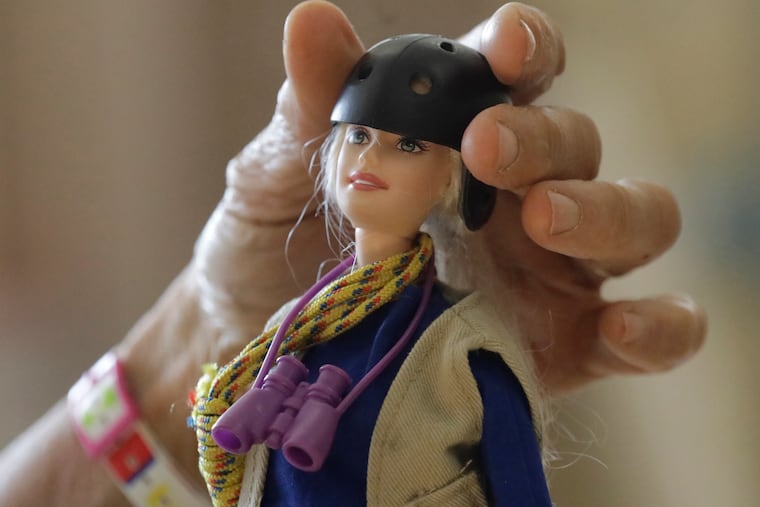She helped Mattel create new line of scientist Barbies
The line of dolls, which includes an astrophysicist, a conservationist, an entomologist, a marine biologist and a nature photojournalist, are long overdue, said Nalini Nadkarni.

Nalini Nadkarni didn’t play with Barbies as a girl. She was too busy climbing the maple trees in her front yard in Bethesda, Md.
The forest ecologist might seem an unlikely person to help design and promote Barbie dolls. But over the past six months, she has been inspiring girls worldwide to play with dolls that come with a magnifying glass and all-terrain boots instead of tiaras and high heels. It’s through new explorer Barbie dolls designed with her input by Mattel and National Geographic.
The line of dolls, which includes an astrophysicist, a conservationist, an entomologist, a marine biologist, and a nature photojournalist, are long overdue, said Nadkarni, 65, a University of Utah biology professor who studies rain forest canopies and how plants get their nutrients.
“When I was growing up in Bethesda, we tried to live simply, following Gandhi’s principles,” she said. “My dad was from India, and a Barbie didn’t quite fit in with living a simple life.”
Instead, said Nadkarni, she and her four siblings were encouraged by their mother, who was a stay-at-home mom, and their father, a pharmacologist, to create their own fun.
For Nadkarni, that meant tree climbing.
“As a child, I had a vivid imagination and could picture the treetop as a place of rescue if the neighborhood flooded, or as a hospital for wounded birds,” she said. “Because no one else [I knew] climbed trees. It was my own world, and I could be anything in it.”
After graduating from Walter Johnson High School in 1972, Nadkarni attended Brown University for her undergraduate degree. Then she received a doctorate in forest ecology at the College of Forest Resources at the University of Washington in 1983. In 2014, she received an honorary doctorate in science from Brown University.
Her work has included bringing nature into prisons to help soothe inmates who are anxious and potentially violent.
Nadkarni is doing research in Costa Rica on trees that are still standing after farmers cut down the majority of the forest on their land.
It has never been more important, Nadkarni said, to share with a new generation what she has learned.
“These explorer Barbies are a big step forward,” she said. “It’s not perfect — Barbie still has that impossible body shape and is made of plastic — but it’s a good start.”
Nadkarni, who received a custom-designed Barbie in her likeness from Mattel as a thank-you for her efforts, said she had spent years trying to persuade the toy company to develop a “treetop Barbie” with no luck.
“In 2003, I’d been thinking of ways to help get girls more interested in science, and I asked myself, ‘What do girls care about when they’re little?'" she recalled.
She looked to her young daughter.
“I knew that girls wanted to play with Barbies and look like Barbies,” Nadkarni said. “But what if Barbie had field clothes on and came with a little booklet about canopy plants?”
Mattel wasn’t interested in her idea (Nadkarni said she was told that a “treetop Barbie” wouldn’t sell), but she persisted.
She finally created her own treetop dolls, retrofitting Barbies bought at thrift stores with sturdy boots, helmets, and climbing harnesses. Mattel agreed that she could produce the dolls on a small scale, and Nadkarni sold about 400 by request over 15 years through her website to friends, her students, and others who had heard about her efforts to introduce girls to the science-themed dolls.
» READ MORE: Philadelphia’s new toy library lets families save money while forming a community.
Last year, Nadkarni was thrilled to learn that National Geographic was working with Mattel to come up with a new line of adventure dolls, and that they wanted her to serve on their advisory committee.
“That Mattel has perceived there is a market for dolls emulating adventurous women scientists to which young girls can aspire is a great thing,” Nadkarni said. “It’s a hopeful manifestation of the fact that although there are still inequities in science with women and men, there is a desire for girls to play with an explorer Barbie.”
Since sales of the explorer Barbies began in the summer on the National Geographic website and at retailers such as Target and Walmart, Nadkarni said, she has heard from girls coast to coast. They thank her for her work in tropical rain forests and ask questions about how they can make a difference to help trees in their own communities.
Nadkarni has since held ecology discussions with about a dozen elementary school classrooms across the country, she said, hoping to pass along her passion for caring for the environment and the world's endangered forest canopies.
“When I started hearing from these young kids, I realized they had a true sense of the dire straits of our forests,” she said. “They really care, and they want us grown-ups to do something to save our environment. It gives me hope for the future that girls — and boys — as young as 7 and 8 want to do what they can to help.”